Russian Bear
The Russian Bear (Russian: Русский медведь, romanized: Russky medved) is a widespread symbol (generally of a Eurasian brown bear) for Russia, used in cartoons, articles and dramatic plays since as early as the 16th century,[1] and relating alike to the Russian Empire, the Soviet Union and the present-day Russian Federation. It often was and is used by Westerners, originated in British caricatures and later also used in the United States, and not always in a flattering context – on occasion it was used to imply that Russia is "big, brutal and clumsy" (see 19th-century cartoon below).
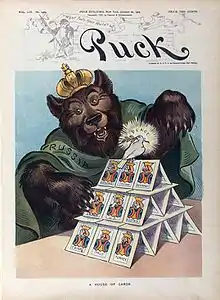
History
The bear image was, however, on various occasions (especially in the 20th century) also taken up by Russians themselves. Having the bear cub "Misha" as the mascot of the 1980 Moscow Olympic Games was evidently intended to counter the "big and brutal Russian Bear" image with a small, cuddly and smiling bear cub.
In Ronald Reagan's successful 1984 re-election campaign, he used the bear motif in the famous "Bear in the woods" ad, which claimed that he recognized the existence of a Soviet threat, and that his opponent denied its existence.
In Russia, associations with the image of the bear have received relatively mixed reactions. On one hand, Russians themselves appreciate the bear for its raw power and cunning, and bears are very often used as mascots or as a part of a design on a logo. On the other hand, the overuse of the image of the bear by foreigners visiting Russia prior to 20th century led to the image of bear being a sort of insider joke, postulating that "Russian streets are full of bears" as an example of factually inaccurate information about Russia.
After the dissolution of the Soviet Union, there was some support in the Russian Parliament for having a bear as the new Russian coat of arms – with the proposers pointing out that "Russia is anyway identified in the world with the Bear" – though eventually it was the Tsarist-era coat of arms of the double-headed eagle that was restored.
Later, the bear was taken up as the symbol of the United Russia Party, which has dominated political life in Russia since the early 2000s. Coincidentally, the surname of Dmitry Medvedev, the Russian president elected in 2008, is the possessive adjective of медведь: i.e. his surname means "bear's".
Gallery
From Russia
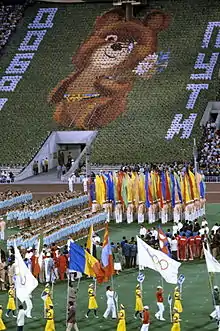 Misha the teddy bear, the mascot of Moscow Olympics (1980)
Misha the teddy bear, the mascot of Moscow Olympics (1980) Banner depicting the Russian Bear unfurled by Russian football supporters (the inscription says "Forward, Russia!").
Banner depicting the Russian Bear unfurled by Russian football supporters (the inscription says "Forward, Russia!").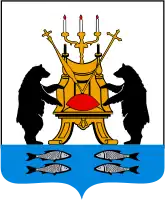 Coat of arms of Novgorod
Coat of arms of Novgorod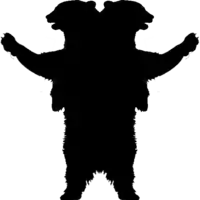 The humorous image of four-pawed double-headed bear posing as double-headed eagle
The humorous image of four-pawed double-headed bear posing as double-headed eagle
From outside Russia
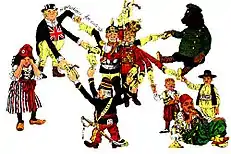 The Russian Bear (sitting, to the right) among the European powers courted by Bismarck in order to isolate France.
The Russian Bear (sitting, to the right) among the European powers courted by Bismarck in order to isolate France.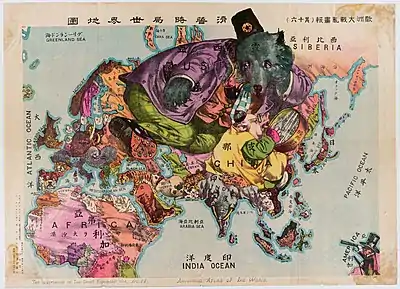 A humoristic Japanese world map representing Russia as a big bear
A humoristic Japanese world map representing Russia as a big bear.jpg.webp) Cartoon from the English satirical magazine Punch, or The London Charivari. With the Russian Bear sitting on the tail of the Persian cat while the British Lion looks on, it represents a phase of The Great Game. The caption reads: "AS BETWEEN FRIENDS. British Lion (to Russian Bear). 'IF WE HADN'T SUCH A THOROUGH UNDERSTANDING I MIGHT ALMOST BE TEMPTED TO ASK WHAT YOU'RE DOING THERE WITH OUR LITTLE PLAYFELLOW.'"
Cartoon from the English satirical magazine Punch, or The London Charivari. With the Russian Bear sitting on the tail of the Persian cat while the British Lion looks on, it represents a phase of The Great Game. The caption reads: "AS BETWEEN FRIENDS. British Lion (to Russian Bear). 'IF WE HADN'T SUCH A THOROUGH UNDERSTANDING I MIGHT ALMOST BE TEMPTED TO ASK WHAT YOU'RE DOING THERE WITH OUR LITTLE PLAYFELLOW.'"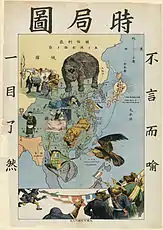 Chinese view of THE SITUATION IN THE FAR EAST, 1905. Bear for Russia intruding from the north, bulldog for the United Kingdom in south China, frog for France in southeast Asia, and American eagle for the United States approaching from the Philippines.
Chinese view of THE SITUATION IN THE FAR EAST, 1905. Bear for Russia intruding from the north, bulldog for the United Kingdom in south China, frog for France in southeast Asia, and American eagle for the United States approaching from the Philippines.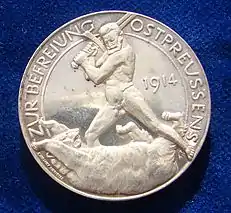 The reverse of a World War I German Silver medallion liberation of East Prussia 1914 by Paul von Beneckendorff und von Hindenburg. Referring to the Battle of Tannenberg. The naked General Hindenburg fighting the Russian Bear with his sword.
The reverse of a World War I German Silver medallion liberation of East Prussia 1914 by Paul von Beneckendorff und von Hindenburg. Referring to the Battle of Tannenberg. The naked General Hindenburg fighting the Russian Bear with his sword.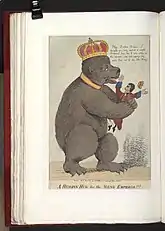 British political cartoon concerning Napoleon's invasion of Russia 1804.
British political cartoon concerning Napoleon's invasion of Russia 1804.
References
- Christine Ammer, It's Raining Cats and Dogs and Other Beastly Expressions (BookBaby, 2012)
External links
![]() Media related to Russian Bear at Wikimedia Commons
Media related to Russian Bear at Wikimedia Commons
- Rossomakhin, A.; Khrustalev, D. (2008). "Russia as a Bear: origins of the visualization (16th–18th centuries)" (in Russian). IvSU. Cite journal requires
|journal=(help) - Rossomakhin, A.; Khrustalev, D. (2008). "Russia as a Bear". Neprikosnovennyy zapas (in Russian). 1 (57). Archived from the original on 2011-07-23.